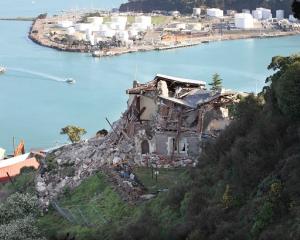Business interruption insurance is one the most complex on the market but crucial.
Otago Chamber of Commerce chief executive John Christie said the destruction wrought by the earthquake in Christchurch during the weekend would prompt "dramatic changes" to insurance cover, employment law and future infrastructure needs.
"For some businesses, this [earthquake] will be catastrophic, having underinsured themselves or if they lowered their level of cover during the recession," he said.
Some Christchurch businesses are calling for assistance as they grapple with destroyed buildings and the short-term effects on their future viability as going concerns.
"Many businesses will not be able to carry their staff through ... they cannot be paid for activities they can't undertake," Mr Christie said.
However, one of the largest New Zealand-owned insurance brokerages believes small to medium-sized enterprises (those with fewer than 20 staff) affected will have "business interruption" insurance, but some of that cover will be inadequate.
Rothbury Insurance Brokers' Otago branch manager Peter McAuliffe said the majority of its small to medium enterprise clients were insured against business interruption, but this type of insurance was "one of the most complex".
It was difficult to strike the right level of cover, both the financial level required and the extent of the time required to be indemnified.
"Businesses need to determine the sum involved when taking out insurance. It is easy to underestimate and become underinsured. They need to work closely with their broker," Mr McAuliffe said.
Under the umbrella of business insurance, there are three core policies, of material damage (to buildings, plant and stock), business interruptions (including loss of revenue, staff pay, paying debt and lease obligations, and forward orders) and business liabilities.
Mr McAuliffe said insurance covering "prevention of access" would be important to many Christchurch businesses, especially those unaffected and able to open but where access issues might discourage customers.
For a business with fewer than 20 employees, and turnover less than $500,000 and with less than $100,000 stock, Mr McAuliffe said annual premiums would be "at least $1500-$2000".
Of that, about $700 would be on business interruption, material damage $600 and public liability $200.
Mr McAuliffe said, in general, insurers would pay for a percentage of loss of turnover, but take into account savings made.
The period of time businesses could retain staff and continue to pay them varied, as policies could cover a payout period, of usually anywhere between three months to 18 months.
"Staff wages can be paid for the full term of the policy, if the sum insured was adequate," Mr McAuliffe said.
Fish-hooks in insurance for businesses to be aware of include "taking a punt" by underinsuring or underestimating the extent of coverage required, in order to save on premiums.
"It is common for businesses to be underinsured to reduce costs," Mr McAuliffe said.
The three main items to insure under business interrupt policy are loss of revenue, additional cost of working (hiring alternative premises) and claims preparations cost. being the collation of information to "quantify the loss", which would include charges of an accountancy firm, Mr McAuliffe said.
Insurance Council of New Zealand spokesman Chris Ryan said one of the largest concerns was the repayment of debt and ongoing costs such as leases if a business was interrupted.






